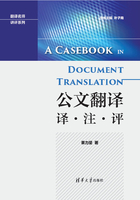
8 The Obligation to Extradite or Prosecute
原文
One of the crucial problems which has to be solved by the International Law Commission during the elaboration of principles concerning the obligation to extradite or prosecute will be, without any doubt, to find a generally acceptable answer to the question if the legal source of the obligation to extradite or prosecute should be limited to the treaties which are binding the States concerned, or be extended to appropriate customary norms or general principles of law.
There is no consensus among the doctrine as it concerns this question, although a large and growing number of scholars join the opinion supporting the concept of an international legal obligation “aut dedere aut judicare” as a general duty based not only on the provisions of particular international treaties, but also on generally binding customary norms, at least as it concerns certain categories of crimes. Some of the authors try to prove the existence of such customary norms through general practice deriving from treaties:
“… it is reasonable to assert that if a state has signed and ratified a significant number of treaties containing the aut dedere aut judicare formula, then that state has demonstrated through this practice that aut dedere aut judicare is a customary norm.”
原译文
引渡或起诉的义务
国际法委会在细化[60]引渡或起诉义务时,无疑必须解决一个关键问题,即能否为引渡或起诉义务的法律来源找到一个普遍接受的答案:引渡或起诉义务的法律渊源应当受相关各国所签协议限制[61]还是应当适用合适的惯例法规或者一般法律原则[62]。
法律原则并没有就这一问题达成共识,虽然越来越多学者支持这样的观点,即:把以特别国际条约条款及普遍有效的习惯法为基础的引渡或起诉国际法律义务作为一般责任,且该国际法律至少涉及此类犯罪一些类别[63]。部分作者试图通过条约中的通常做法证明此类惯例法规的存在[64]:
“……如果一国已签署和批准了多种包含‘引渡或起诉’条款的协定,我们便可以称这个国家是在以实际行动支持引渡或起诉这一习惯规范。”[65]
点评
[60]这里用“细化”不确切,“细化”是指主旨或提纲已经就绪,需要的是增添细节内容。但本文讨论引渡或起诉义务时,不是说这种义务的主要内容已经具备,而是探讨这种义务是否存在。elaborate虽然意为develop or present (a theory, policy, or system) in detail,但在本文语境里重点是在develop or present (a theory, policy, or system),而不是在于in detail。
[61]译者对原文的理解出错,the legal source ... should be limited to the treaties的意思是“法律渊源……应该限于……条约”(也就是说仅仅把条约作为法律渊源),而不是说“法律渊源受条约限制”。另外,treaty不能译成“协议”。虽然从广义上来说,条约也是一种协议,但条约有其特定的定义,一般仅仅指两个或两个以上国家签订的确定签约国在政治、经济、军事、文化等方面所拥有的权利和义务的协议,而不是任何协议。协议的范围要广得多,可以指两个或两个以上实体为了开展某项活动经过协商后双方达成的一致意见。协议可以是书面的,也可是口头的,而条约必定是书面的。
[62]the legal source ... should ... be extended to appropriate customary norms or general principles of law是说“把相关习惯规范或一般法律原则也作为……法律渊源”,或者说“扩大……法律渊源的范围,使其也包含相关习惯规范或一般法律原则”。原译文与原文含义相去甚远。
[63]这句话译文有不少问题。第一,There is no consensus among the doctrine as it concerns this question译成“法律原则并没有就这一问题达成共识”,完全不通。之所以不通,问题在于搭配,人们可以“达成共识”,但我们不能说“原则……达成共识”(我们不能按此方式把原则拟人化)。此处的doctrine指的是“学术理论”。如果我们换一种说法,这段话可以改成There is no consensus among scholars as it concerns this question。第二,a large and growing number包含两层意思:一是人数很多;二是人数在增加。原译文里只体现了第二层意思(growing),而忽略了large的意思。这种处理方式也是不可取的,没有完整体现原文的所有信息要素。第三,长句处理不当,详见下文的讨论。第四,particular international treaties中的particular近似于specific,而不是special or more than usual,因此译成“特别”是不合适的。类似的例子如下(其中的particular都不宜译成“特别”):
• Now they want to know how much a particular commodity affects the price of a good.现在他们想了解特定商品影响某一货物的价格的程度。
• Every issue will focus on a particular dish or ingredient.每一期都将重点介绍一道菜或一种配料。
第五,译者对at least as it concerns certain categories of crimes的理解有重大错误。
[64]对于Some of the authors try to prove the existence of such customary norms through general practice deriving from treaties,译文有几个问题。第一,“通常做法”并不是“条约中的”,而是“产生于”条约的,这两者是有别的。称这些做法是“条约中的”,似乎意味着条约中对这些做法作了规定,而deriving from treaties是指“由于条约的存在,才有这些做法”,或“根据条约行事而形成的做法”。第二,authors译成“作者”不算大问题,但在中文里“作者”一词一般用来指特定书籍或文章的作者,此处我们没有谈到任何书籍或文章,而是泛指发表法律学术见解的人,因此用“学者”比较合适。
[65]译文意思有较大偏差。对于that state has demonstrated through this practice that aut dedere aut judicare is a customary norm,译文是“这个国家是在以实际行动支持引渡或起诉这一习惯规范”,而作者不是在谈“支持”与否,而只谈到表明(demonstrated)一种情况(即“该国已凭此做法表明引渡或起诉是一项习惯规范”)。另外,a significant number译成“多种”似乎分量欠缺一点。
参考译文
引渡或起诉的义务
毫无疑问,国际法委员会在拟订关于引渡或起诉的原则时必须解决的关键问题之一是给下列问题找到一个普遍接受的答案:引渡或起诉的义务的法律渊源究竟应该限于对有关国家有约束力的条约,还是应该扩大到有关的习惯规范或一般法律原则。
学术界对这个问题并无共识,不过有一种意见认为应将 “引渡或起诉”( aut dedere aut judicare)的国际法律义务概念作为不仅依据特定国际条约的规定,而且也依据有普遍约束力的习惯规范的一个普遍责任,至少对某些种类的罪行是如此。支持这种意见的学者很多,而且越来越多。有些学者设法通过产生于各项条约的一般惯例,证明这样的习惯规范是存在的:
“……有理由断言,如果一国已经签署并批准载有引渡或起诉的条款的相当多的条约,那么,该国已凭此做法表明引渡或起诉是一项习惯规范。”
短文 长句的处理
与中文比较,英语里长句较多。除各种从句外,英语里还广泛使用介词短语、不定式短语、分词短语、同位语、插入语,等等。由于介词、连词、分词等在表面结构上的衔接和粘连作用,即使句子较长,句子成分之间的关系也能保持清晰。而中文则不然,中文里虽然也有介词和连词,但其衔接和粘连作用不强。因此,中文句子越长,传递信息的效率降低的风险就越大。针对中英文的这一差异,翻译英语长句的一个主要手法就是拆分。至于如何拆分,笔者觉得我们没有现成的规律可循,只能具体情况具体分析。不过,有一点似乎可作为定律:拆分必须着眼于完整的信息片段。以下列句子为例:
There is no consensus among the doctrine as it concerns this question, although a large and growing number of scholars join the opinion supporting the concept of an international legal obligation “aut dedere aut judicare” as a general duty based not only on the provisions of particular international treaties, but also on generally binding customary norms, at least as it concerns certain categories of crimes.
从翻译需要的角度来考虑,我们也许可以把这句话分为以下6个信息片段:(1)There is no consensus among the doctrine as it concerns this question;(2)a large number of scholars join an opinion;(3)a growing number of scholars join the opinion;(4)the opinion supports the concept of an international legal obligation “aut dedere aut judicare” as a general duty;(5)the general duty is based not only on the provisions of particular international treaties, but also on generally binding customary norms;(6)an international legal obligation “aut dedere aut judicare” should become a general duty, at least as it concerns certain categories of crimes.
这6个片段在英语里构成一个句子。这一点在翻译时不是一个考虑因素。我们可以分别译出这6个片段的内容,再根据逻辑关系及中文表达习惯加以排列,译文可以用一个、两个或多个句子,信息片段可以合并,也可以分开处理。笔者认为,以下几种译文都是可以的:
【译文一】许多学者表示支持把“引渡或起诉”的国际法律概念作为一项普遍责任,至少对某些种类的罪行是如此。而这一普遍责任不仅依据特定国际条约的规定,而且也依据有普遍约束力的习惯规范。赞成这种看法的学者越来越多。尽管如此,学术界对这个问题尚无共识。
【译文二】学术界对这个问题并无共识,虽然数目很多而且越来越多的学者表示支持把“引渡或起诉”的国际法律义务概念作为不仅依据特定国际条约的规定,而且也依据具有普遍约束力的习惯法规范的一个普遍责任,至少对某些种类的罪行是如此。
【译文三】学术界对这个问题并无共识,不过有一种意见认为应将 “引渡或起诉”的国际法律义务概念作为不仅依据特定国际条约的规定,而且也依据有普遍约束力的习惯规范的一个普遍责任,至少对某些种类的罪行是如此。支持这种意见的学者很多,而且越来越多。